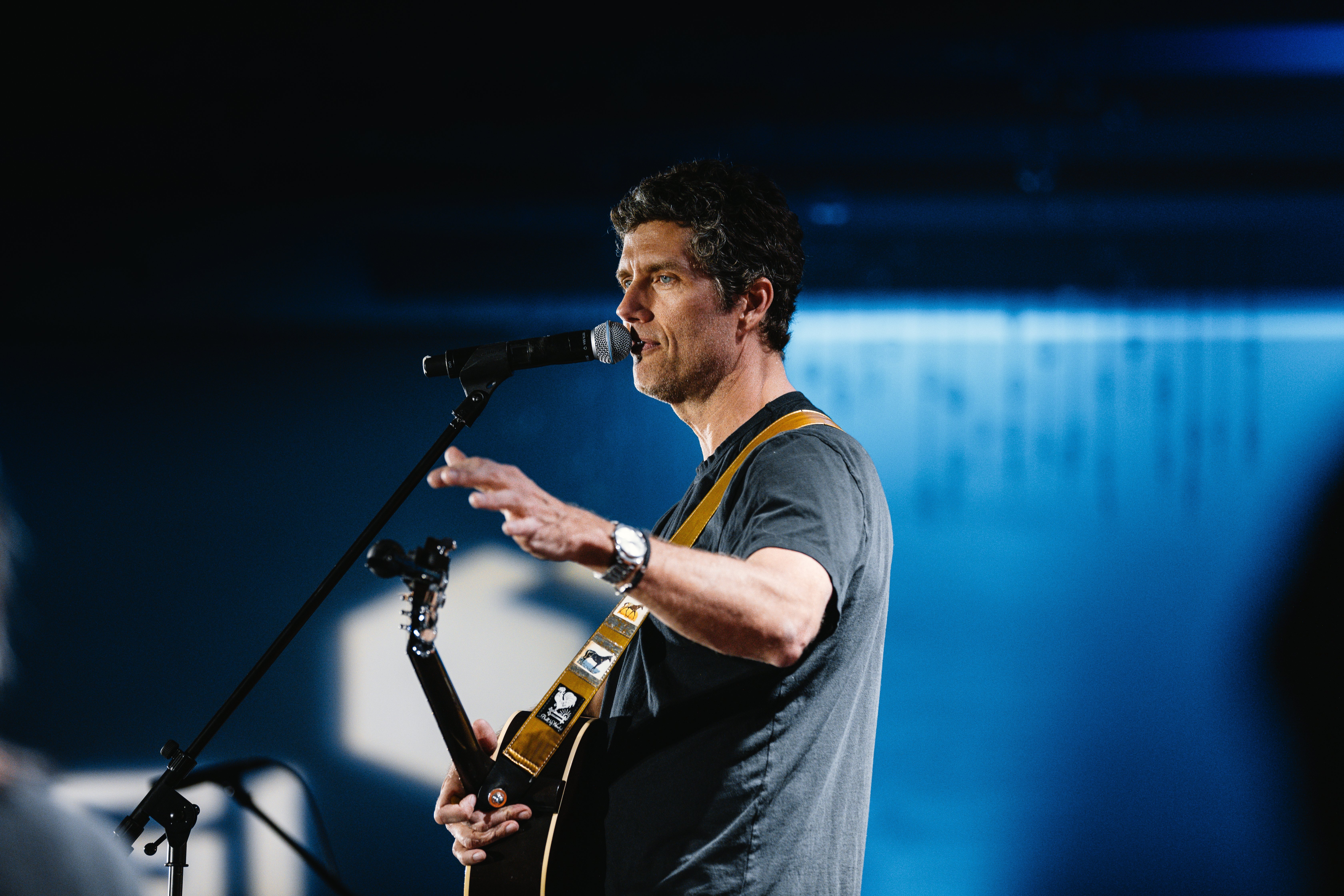
In 1995, a little song called “Good” from a little band called Better Than Ezra climbed up the Billboard charts to reach the number one spot for Modern Rock. Their debut album Deluxe went platinum by the end of that year, helping to define the distinct sound of post-grunge ‘90s alternative rock.
Things have remained pretty good for Better Than Ezra’s lead singer and songwriter Kevin Griffin ever since then; while the band might not have ever re-captured the spark of their platinum-selling smash debut, Griffin has gone on to have an enviable career as a songwriter for artists like Howie Day, the Barenaked Ladies, James Blunt, Sugarland, and Blondie. He’s also gotten into artist management and music publishing, and now, with the five-year-old Pilgrimage Festival, he’s a music festival producer too. You could even say life’s been better than good for him!
But none of that came easily, and having to reinvent himself after the band was dropped from their record label was difficult, as it would be for anyone who experienced so much success so early on and then having to somewhat start over.
Kevin Griffin songwriting exercise
In addition to his 30 years working in the music industry, Griffin also performs gigs as a public speaker, approaching collaboration and creativity through the lens of a hit songwriter and using lessons learned from his industry—music is a business, after all—to coach business leaders in other industries.
“Pablo Picasso said we're all born artists, but the challenge is how do we stay artists as we get older?”
Griffin kicked off a session at RestaurantSpaces in Miami with a mix of performance and stories, sharing his own experiences and the five key things he has learned along the way as he has found success through continued transformation and collaboration.
“Pablo Picasso said we're all born artists, but the challenge is how do we stay artists as we get older?” he started, guitar slung across his chest. “How do we grow into our creativity as opposed to grow out of it?”
He continued by stating that if we agree with Picasso’s premise that we are all artists in some way—that we all bring some form of creativity to our daily endeavors regardless of our industry—then the tools that help one “artist” might also help another.
His talk was all about sharing the five tools—or lessons—that help him, and he told the stories behind each of those lessons interspersed with songs he co-wrote that he associates with those lessons.
Griffin said that to understand the creative arc of his life, we have to go back to the ‘90s—to the years immediately following the enormous success of Deluxe. In 1998, the band’s album sales were going down; in 2001, Better Than Ezra was dropped from their record label.
“It was a gut punch to my ego,” he said. “After about six months of licking my wounds, I had to look at myself in the mirror and ask what happened.”
He had always been a self-starter, he said, but suddenly something wasn’t working. In the summer of 2001, Better Than Ezra was starting over as a band, making an independent record in a very expensive studio in L.A. they were sharing with Justin Timberlake, who was then recording his solo debut, and…Meatloaf.
Griffin certainly never thought Meatloaf would be the man who would help change his life, but such things rarely go to plan. It was here that he discovered the first of the five tools he now uses to keep himself engaged, relevant, successful, and ultimately happy: collaboration.
After he unexpectedly found himself co-writing with Meatloaf, it opened his mind to collaborating with people and bringing people in with skill sets he doesn’t necessarily have.
“I started surrounding myself with different people who brought that to the table, and I started reading books by [business executive and author] Jack Welch,” he said. “I saw that not only were successful people talented in their own right, but where they really shined was in surrounding themselves with talented people and letting them do what they were brought in to do.”
He admitted that it’s hard to bring great people into your work and allow them to do their work without micromanaging their technique, but it pays dividends in the end.
“Doors opened for me that never had been opened before,” Griffin said.
The second thing he likes to do he calls “filling the well.” He thinks of creativity as a finite well: everything you create comes out of everything you’ve done and experienced in your life, which fills your well. When you create, you draw from that well, but many artists don’t refill that well after initially drawing from it. So the inventiveness and relevance of the content of that well wanes; this is how artists stagnate and become irrelevant.

Griffin admitted that happened to him from 1995 to 2001, so he became a “voracious” consumer of current music and all things related to the music industry.
“By knowing these things in my business—when a producer is leaving a label, what songs are hot right now—I'm able to connect the dots and get more work,” he said.
He notices when talking to some of his peers in the songwriting industry that they’ll lament how the industry has changed and they’re not getting as much work. When he asks them what the number one song in the country is right now, they don’t know and will usually dismiss it as something that “sucks”…except it’s making money, and they’re not.
“Their ego prevents them from looking at their peers and seeing what their peers are doing, or what the competition is doing,” Griffin said. “For me as a songwriter, I'm always doing a deep dive, listening to songs I wish I had written by people I'm kind of jealous off. I'll take a hit song I like and deconstruct it piece by piece to see what the magic is in the song.”
The third thing he learned is “change your attitude.” Here he talked about “Big Al” Anderson, a prolific songwriter who is also a licensed pilot. Anderson uses the phrase “change your attitude,” which has a dual meaning: in aviation, “attitude” is your angle of approach.
“With any creative endeavor, sometimes what you normally do isn’t working,” he said. That’s when he hears those words from Big Al in his head: “Son, you gotta change your attitude.”
“If I change my angle of approach to break a creative deadlock, often times I’m rewarded.”
The fourth lesson Griffin learned is “leave your comfort zone,” and his comfort zone is his studio in Franklin, Tennessee. Sometimes the magic just isn’t happening there, and all it takes is being a little off-balance in a different environment to come up with something he otherwise wouldn’t have.
Finally, the fifth thing that he has learned is “dare to be stupid.” Griffin paraphrased the knighted educator Sir Ken Robinson by saying, “You’re never going to come up with something truly groundbreaking unless you’re prepared to fail.”
" When I second guess myself, I’m screwed "
This means that you have to be okay with having bad ideas. You can’t worry about being wrong or sounding stupid. In songwriting, you have to be willing to throw all kinds of ridiculousness against the wall to see what sticks.
“When I second guess myself, I’m screwed,” he said. He recalled the one time he wrote with the one-man hit machine Max Martin: he was so intimidated he kept second-guessing himself, and that was the only time he wrote with Max Martin.
In summary, he said, “When you do all these things, you open yourself up to amazing possibilities.”
He ended his talk by writing a song with the audience called “World Class”—take a listen and try to not get it stuck in your head!
RestaurantSpaces is heading to Los Angeles in 2020 (March 1-3). Request an Invite!

Posted by
A One of a Kind Retreat for Hotel Development, Design & Construction Leaders.
Oct 25-27, 2026 | Fort Lauderdale, FL
Learn more
© Copyright 2025 influence group. All Rights Reserved
Comments